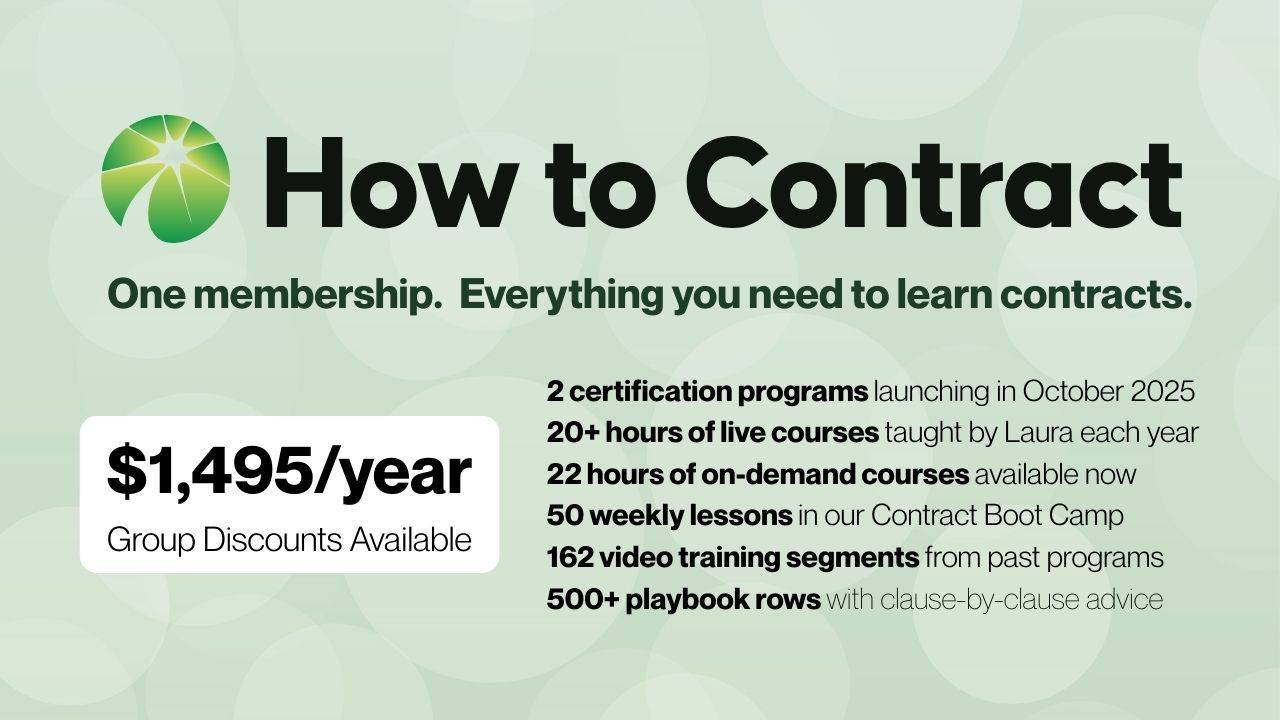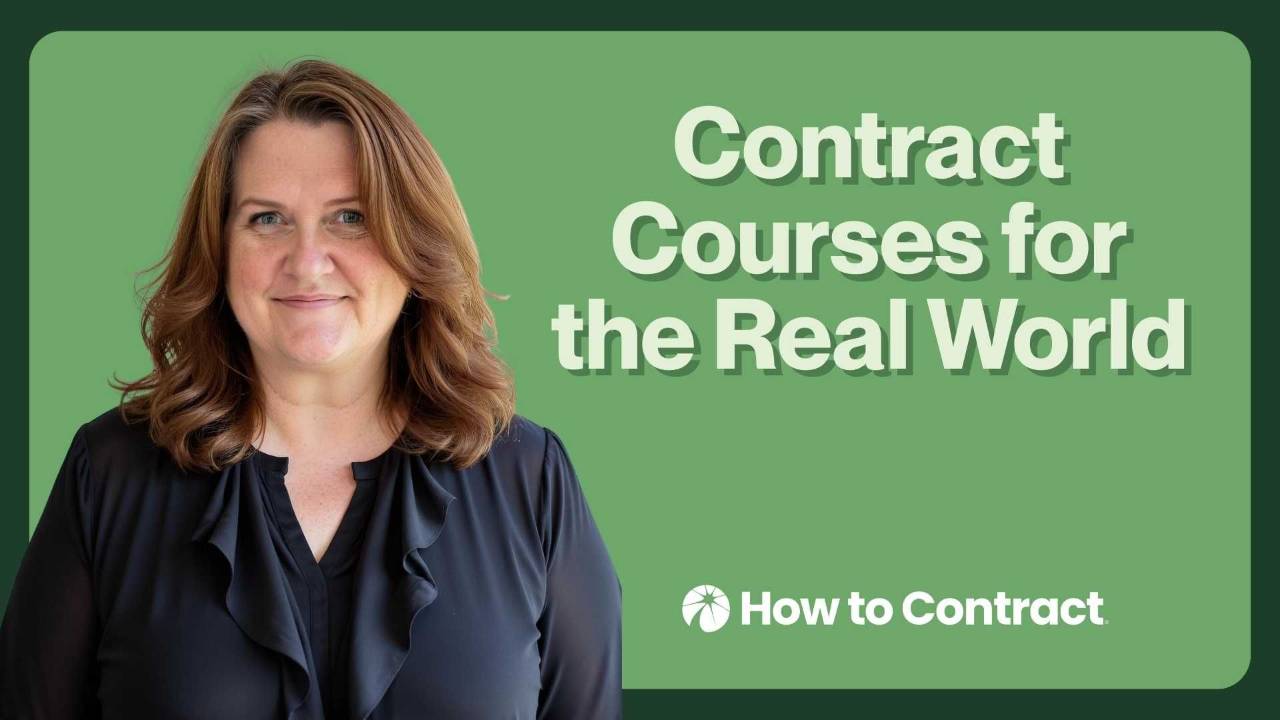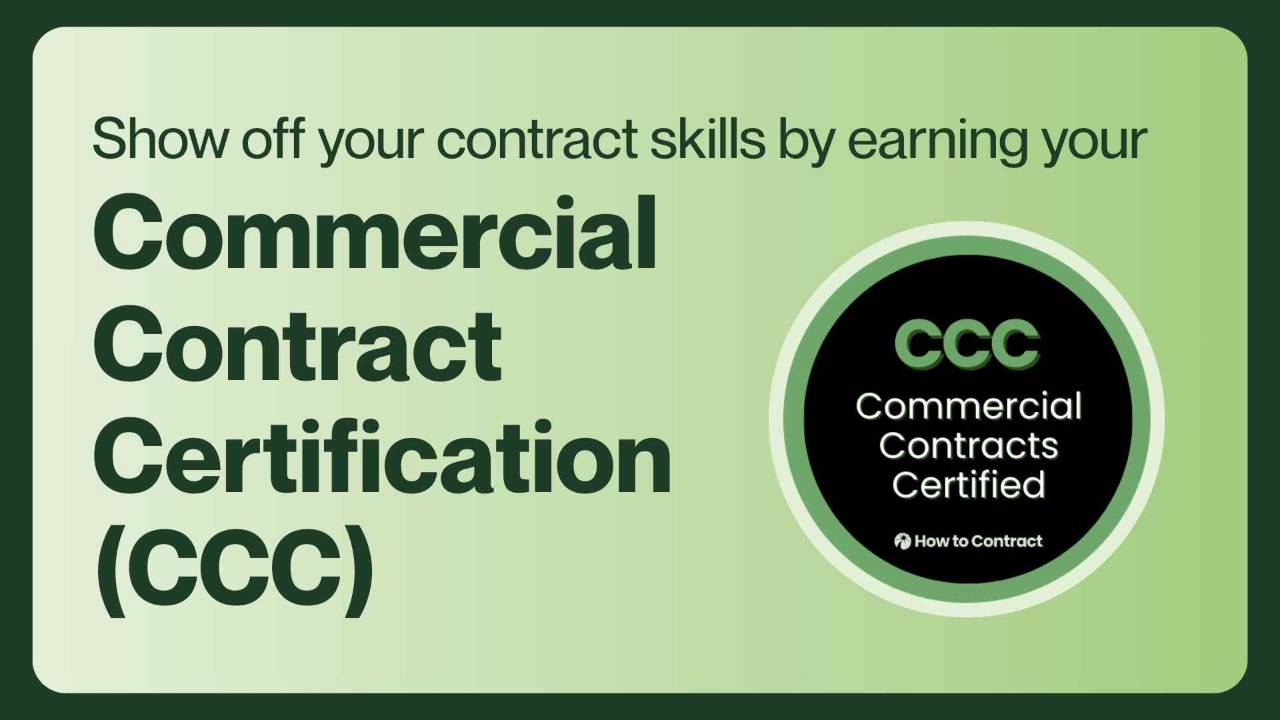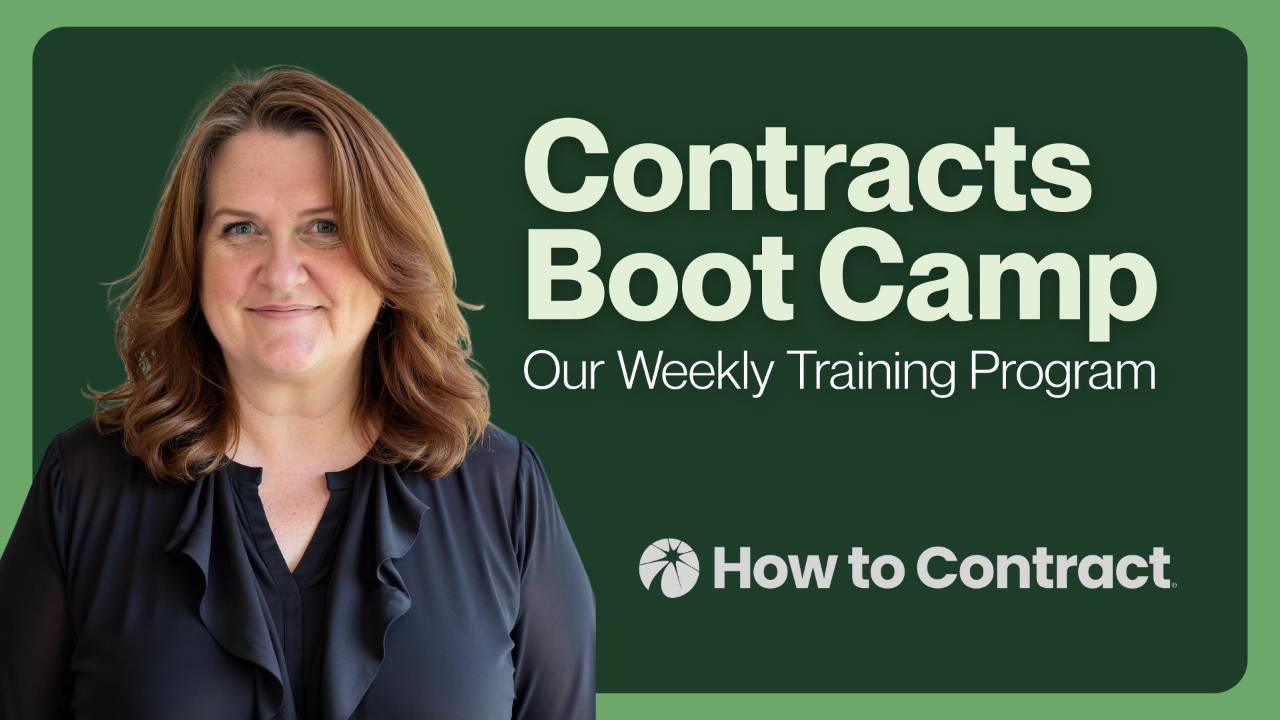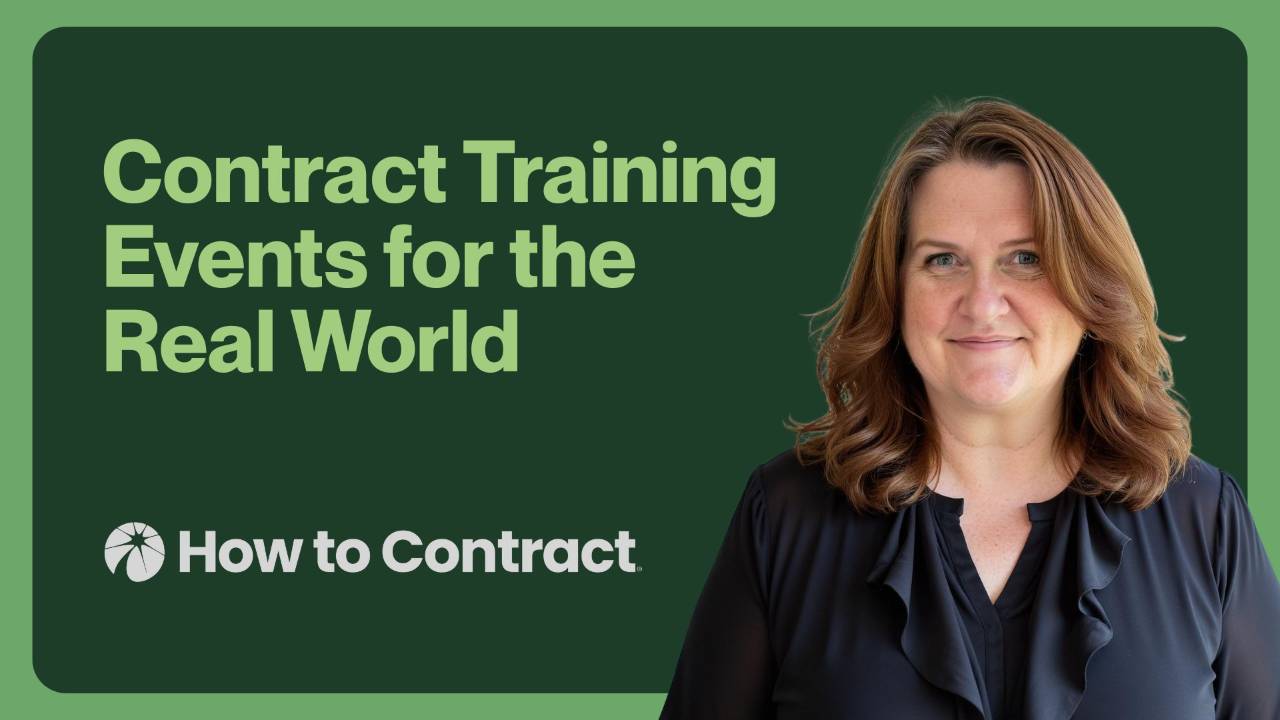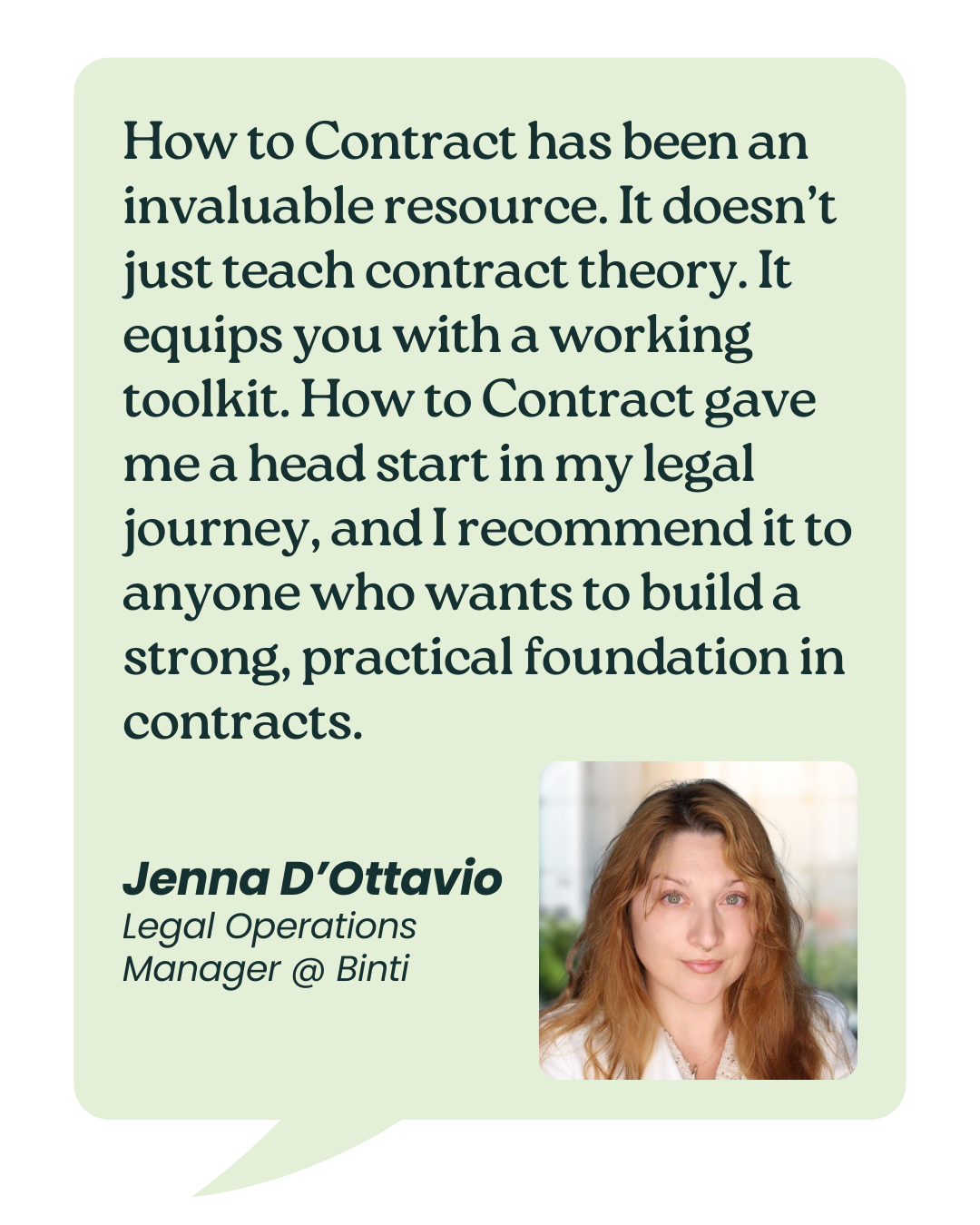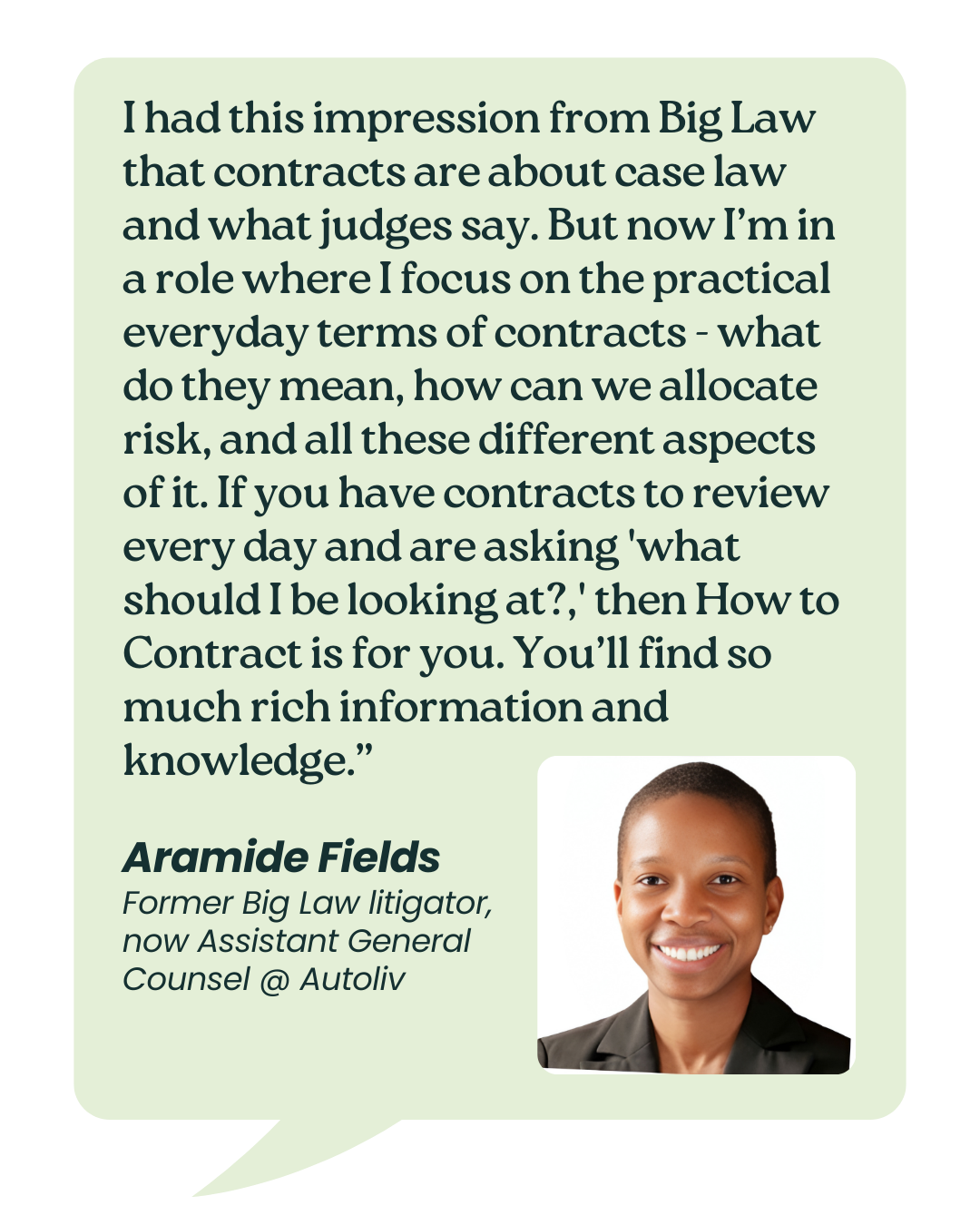
How I Contract: Insights from Noelle McCall, Co-Founder of Contract Risk Academy
We interviewed Noelle McCall, Co-Founder of Contract Risk Academy, as part of our How I Contract interview series. These interviews are designed to offer various perspectives from experienced lawyers and contract professionals on what works in contracts in the real world.
Overcoming Early Contract Challenges
Noelle, thank you for doing this interview. Let’s talk contracts! 🙂 What was your biggest challenge when you started working with contracts?
When I started working on contracts, my biggest challenge was knowing what I didn’t know. I did not have a mentor who could show me the ropes, so I had to learn through trial and error. Learning what works best takes time, effort, and many contract reviews.
Reflecting on Past Experiences
If you could go back in time, but keep all the knowledge and experience you have now, how would you deal with it?
If I could go back in time but keep all of my knowledge and experience, I would create customized tools and insurance requirement templates sooner to save so much time and effort and reduce my clients' contractual risk.
Evolving Contract Drafting Techniques
How have your contract drafting techniques changed over the years? What did you stop doing? What did you start doing?
When I first started doing contract reviews, I was hesitant to do redlines of the insurance requirements as I was concerned I may give the impression of providing legal advice. Instead, I provided general comments on the insurance requirements based on whether or not my client had the required type of insurance policy and policy limits. The problem was my clients did not find general comments to be very useful. They wanted to know what specific changes I would suggest making to the requirements. As a result, I changed my approach and started providing redlines of the insurance provisions based on my client’s current insurance program. I also added a disclaimer to each review to note that I was not a lawyer and I recommended they have their legal team review all contract wording changes prior to use.
A Letter to My Younger Self
What would you write if you could write a short email to your younger self when you were just starting to work with contracts?
If I could write a short email to my younger self when I was just starting to work with contracts, it would look something like this…
“Dear me,
I know you have just started your adventure into the insurance industry and looking at contracts, you have so much to learn, and everything is exciting and new to you.
You may not know it yet, but you will love working on contract reviews for your clients! You will find that each review is like a treasure hunt where you search to see if their insurance policies meet the insurance requirements in their contracts. You will provide clients with expertise they don’t have and very much need. Your detail-oriented skills, curiosity, and analytical nature will be very useful to you as you develop your offerings. You will learn to love being a consultant because you will be the guide who has (or finds) the answers your clients need to be successful.
Brace yourself! Soon you will be balancing time spent with your husband and children, working full time, pursuing your college degree, and chasing insurance designations at the same time. This will be a stressful time for you. You will find yourself getting up early, staying up late, and using most of your precious vacation time to study, write research papers, and do homework. All the hard work will be worth it. You will graduate summa cum laude and be recognized by the President of your university on graduation day.
After some time spent working on all commercial lines, you will make the move to Marsh to specialize in casualty insurance. In a few more years, you will spend most of your day doing contract reviews for your Fortune 500 clients. You will then create and lead a national practice group for contract review at Marsh and Aon.
One day, you will even create your own career based on your specialized knowledge, become an instructor, consultant, speaker, and social media content creator, and you will be on the front line with those exploring the use of AI for contract review.
Never stop learning. I know you can do it. The best is yet to come!
With love from your future self” 🙂
Biggest Lesson Learned in Contracts
What’s your biggest lesson learned in contracts?
Don’t assume that just because the other party to the contract says they won’t accept any changes they won’t consider making some changes if you provide logical arguments in favor of the changes and limit the changes to those most important to you. It usually doesn’t hurt to ask for changes. If you don’t ask, you don’t get.
Practical Contract Tips
If you could share just one practical, real-life contract tip, what would that be?
After you are done with each contract review, go back through it and double-check things before you send it to the client. I can’t tell you how many times I thought I was done with a review, but upon the second look, I saw things that I wanted to add or change that I missed on my first pass. In speaking with other contracting professionals, they’ve experienced the same thing, so I know it wasn’t just me.
Avoiding Common Contract Mistakes
What mistakes should contract lawyers and professionals avoid when working with contracts? How would you avoid them?
Find someone who understands insurance to review the insurance provisions in your contracts. If no one in your company has this skill, ask your insurance agent/broker or an outside consultant to help.
Key Areas to Watch in Contracts
What’s one of the easiest ways to screw up a contract?
One of the easiest ways to screw up a contract is to overlook how insurance can and should be used to support indemnity terms. Indemnity and insurance requirements are like belts and suspenders because if one fails, the other may save you. Insurance serves as another source that can pay claims if things go wrong.
Simple Hacks for Contract Drafting and Negotiation
Are there any simple hacks our readers can use right away to improve their contract drafting and negotiation skills?
If you are not an insurance expert, one tip you can use right away to improve your contract drafting and negotiation skills is to seek an insurance expert to create updated, best-in-class insurance requirement templates for your contracts with downstream parties.
Insurance requirements should be updated at least every 3 to 5 years to remain up-to-date. You need to find someone to do this who not only knows insurance but also has a ton of experience helping their clients with contract reviews. This is because creating/drafting insurance requirements for downstream vendors, subcontractors, etc., to comply with is the most difficult type of contract review you can do. There are many reasons why this is so. You need a lot of experience to know what insurance is usually and customary for each type of contract, which is best-in-class and commercially available.
The end goal is to reduce your company’s contractual risk by transferring an appropriate level of contractual risk to other parties. Realistically, you need decades of experience doing reviews before you achieve this level of skill, and few people qualify.
Recognizing Influential Mentors
If you could give a shoutout to one (or more) person who has influenced your life in contracts (or is your mentor), who would that be?
Zander Galloway, President of Peoples First Insurance, influenced my work on contracts by challenging me to look for opportunities to collaborate with others (instead of only viewing others as potential competitors), to brainstorm with me on ways we can add valuable offerings for clients, and to challenge me to continuously think outside the box to bring our shared vision into reality. This has led to some amazing opportunities that I would never have imagined on my own! For example, if you had told me a few years ago that I would be co-founding an online contract review school where I help teach other insurance, risk management, and legal professionals how to do contract review of insurance and risk-related provisions, I would not have believed it!
How I Help Contracting Professionals
How do you help contracting professionals?
I help contracting professionals by providing client-customized tools, insurance requirement templates, guidance, and training presentations to help simplify and streamline the contract review process and reduce clients' contractual risk. My guidance is provided from an insurance and risk-related perspective, as I am not a lawyer. Please check out my website at https://contractriskacademy.com. You can also email me at nmccall@peoplesfirstinsurance.com.
Suggested Next Interview
Who should we interview next? Why?
I would recommend asking Eliot Wagonheim of First Rule for an interview, as he provides world-class contract training courses, workshops, and templates to help contract professionals decipher legalese, protect their business, avoid legal risk, and get paid on time. I am amazed that he has trained over 10,000 students! His website is Home - First Rule Training. I recently connected with him on LinkedIn and was impressed by his level of knowledge. I would consider him as my counterpart but on the legal side of things rather than insurance.
Additional Resources for How to Contract Members
If you want to learn more about insurance provisions in contracts, check out this video from Crystal Ware explaining critical concepts in insurance provisions.
How to Contract's membership is designed to help you build real-world expertise with commercial contracts. Get access to our comprehensive system of live and on-demand courses, weekly lessons, detailed playbooks, and more. Join today!

